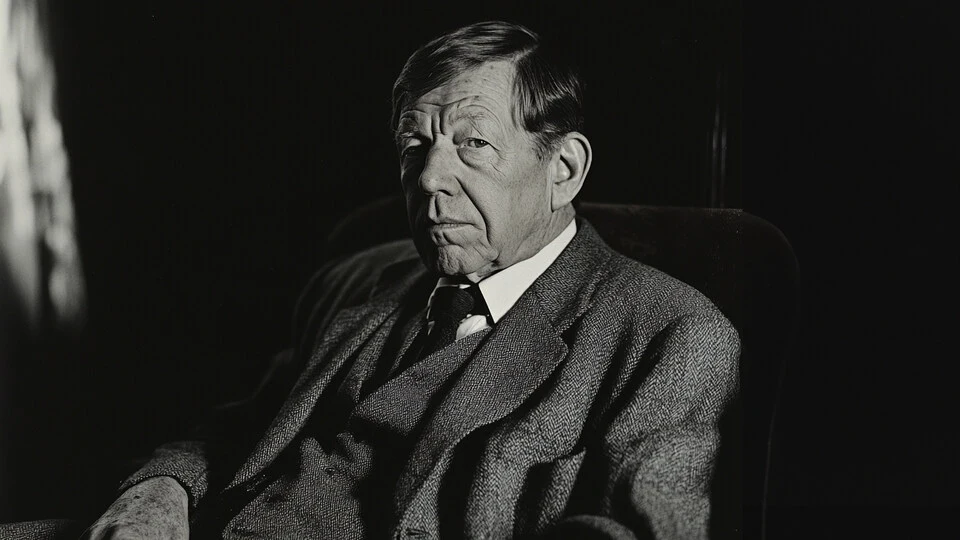“Funeral Blues” is an intensely powerful piece by the British-born poet Wystan Hugh Auden, regarded as one of the giants of modern literature. W H Auden was born on the 21st February 1907, in York, England, and died on the 29th September 1973 in Vienna, Austria. He was a giant in his field in the 20th century as a wit with intellect and emotional depth.
He emigrated to the United States in 1939 and later became a citizen of Anglo-America, which set him in concrete as a transatlantic voice in poetry. He left considered by many an indelible mark on literature.
Auden was known for his intellectual depth, technical mastery, and ability to address both personal and societal themes. and became one of the leading poets of the 20th century, producing works that explored politics, love, morality, and human suffering.
Auden’s early poetry, influenced by T.S. Eliot and modernist techniques, often engaged with the social and political turbulence of the 1930s. His collection Poems in1930 established his standing, and works such as, Look Stranger! in 1936 reflected his concerns about war and totalitarianism. He was involved in left-wing politics and briefly travelled to Spain during the Spanish Civil War, though he later distanced himself from political activism.
When Auden emigrated to America there was marked a shift in both his personal life and poetic style. He became an American citizen in 1946 and began incorporating religious and philosophical themes into his work. His poems from this period, including September 1, 1939 and Musée des Beaux Arts, showcase his keen observation of history, human suffering, and art.
Audens later poetry
Auden’s later poetry focused on love, faith, and the passage of time, with collections like The Shield of Achilles (1955) and Homage to Clio (1960) displaying his evolving perspective. His writing combined wit, irony, and a deep understanding of human nature.
The poem “Funeral Blues” was written in 1938 and portrays the great chasm and suicidal feelings summoned upon one by the death of a loved one. Its raw emotional power speaks universally and makes the poem timeless in issues of mourning and remembrance. Written originally for Auden’s play “The Ascent of F6”, the poem has since then become famous as a free-standing work, held in regard for its touching articulation of grief.
He wishes for the world to stop: clocks stopped from moving, phones silenced, and even the stars and moon dismantled-to show regard for his personal tragedy. Such a picture speaks volumes of the disorientation and depths of sorrow following upon the death of a loved one.
Funeral Blues universality
Its universality has made it present at almost every funeral there is, including that of public figures. Most prominently, “Funeral Blues” reached wide popularity upon its inclusion in the 1994 film Four Weddings and a Funeral, during which it was launched in an emotionally draining eulogy scene that brought Auden’s words to a new generation. This cemented its status as a poignant expression of mourning
The poem is structured in four quatrains, using a simple yet rhythmic form that enhances its emotional weight. It begins with a dramatic request to silence the world:
“Stop all the clocks, cut off the telephone,”
This opening line of “Funeral Blues” establishes the speaker’s overwhelming sorrow, emphasising how personal grief can make the external world feel intrusive. The imagery intensifies as the poem progresses, with references to airplanes writing messages in the sky and the stars being extinguished, highlighting the speaker’s desire for the universe to understand their pain.
At its core, “ Funeral Blues“ captures the devastation of losing a loved one, portraying grief as an all-encompassing experience. Its universal themes, lyrical beauty, and emotional honesty have made it one of the most enduring elegies in modern poetry.
Its lines-most noticeably, “He was my North, my South, my East and West”-have comforted thousands of mourners, saying what many want to or are unable to say: that where a loved one used to be now lies a gaping hole.
Auden’s legacy endures through his influence on modern poetry and his ability to capture the complexities of life in verse. His other work and “Funeral Blues” remains widely read and admired for its linguistic brilliance and profound insight into the human condition.
Funeral Blues
Adding layers of complexity to his work is Auden’s personal life-being openly gay in times when his identity challenged him at every turn. His experiences gave his poetry profound empathy and insight. “Funeral Blues” stands in testimony to this rare ability he had to voice the universality of human emotions for comfort and the connectedness that the exploration of love, loss, and the unyielding grip of grief touches.
Funeral Blues by WH Auden, please click to view poem
For more poem inspiration visit the Save Funeral Costs blog of funeral poems.



